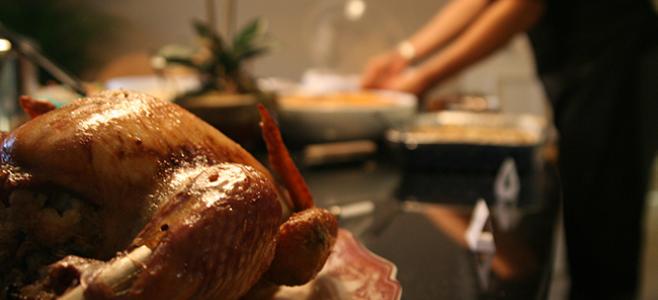
When you think of holiday meals, Bay water quality probably isn’t the first thing that comes to mind. But every year, home cooks inadvertently worsen sewage pollution in San Francisco Bay.
Holiday cooking tends to generate a lot of fatty waste, in the form of leftover cooking oils and greasy pans. When dumped down the sink or garbage disposal, fats harden in the pipes running between Bay Area homes and sewage facilities. This poses a major problem during the winter season, when pipes are already inundated with rain water. When a storm hits, fat-plugged sewer lines overflow and release raw sewage onto city streets and into creeks, streams, and the Bay.
This is no small issue: fatty clogs are one of the leading causes of sewage spills in the Bay Area. Sewage spills release bacteria and other pollutants that can hurt wildlife and people who come into contact with the water.
And—as with everything—the pandemic has only made the situation worse. Restaurants are better equipped to recycle their used cooking oil and grease than home chefs. But since shelter-in-place started in March, more people have been cooking meals at home than ever before. That means more fatty waste going down drain than in past years.
Grease and fat plugs aren’t the only cause of sewage pollution. Many Bay Area sewage systems are old and need upgrades to prevent spills. Baykeeper has worked with 20 Bay Area cities to improve their sewer system infrastructure and stem the tide of rainy season sewage in the Bay.
And we’re supporting Bay Area cities by sharing tips with individuals like you to be sure your home-cooked turkey or discarded salad dressing doesn’t clog sewer lines and harm the Bay.
Baykeeper’s Guidelines for the Bay-Friendly Home Cook:
Try to re-use your leftover fats and oils whenever possible instead of throwing them away. You can even use leftover fats to create a suet feeder for birds.
For any kind of fat or oil-based trash—everything from meat drippings to salad dressing to nut butters—here are some tips to keep in mind:
- Never wash solid or liquid fats down the drain or garbage disposal.
- Wipe down greasy pans with a paper towel and throw the paper towel into the compost or trash bin, according to your local waste facility’s guidelines.
- Pour liquid fats into a milk carton, and dispose of the carton in the trash.
For large quantities of oil—like from a fryer—pour the fat into a sealed bottle and drop off at a recycling facility. Most drop-off facilities accept up to 10-15 gallons per person per day, in containers no larger than five gallons.
Drop-off locations and resources for the Bay Area include these resources from:
- Alameda County and EBMUD;
- Contra Costa County’s CentralSan;
- San Francisco’s Recology center;
- Santa Clara County;
- Zero Waste Marin;
- Napa Recycling;
- and WestBay Sanitary District.
Due to COVID-19 some facilities may require an appointment. Please check with your local drop-off location for details.
Photo at top by Shane Huang, Flickr/CC
